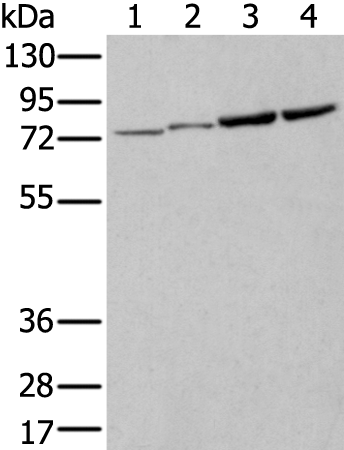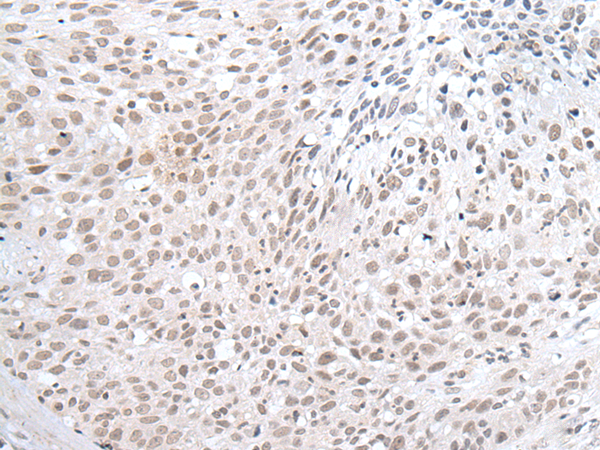

| WB | 咨询技术 | Human,Mouse,Rat |
| IF | 咨询技术 | Human,Mouse,Rat |
| IHC | 1/25-1/100 | Human,Mouse,Rat |
| ICC | 技术咨询 | Human,Mouse,Rat |
| FCM | 咨询技术 | Human,Mouse,Rat |
| Elisa | 1/5000-1/10000 | Human,Mouse,Rat |
| Aliases | ZBTB35; pHZ-10 |
| WB Predicted band size | 71 kDa |
| Host/Isotype | Rabbit IgG |
| Antibody Type | Primary antibody |
| Storage | Store at 4°C short term. Aliquot and store at -20°C long term. Avoid freeze/thaw cycles. |
| Species Reactivity | Human, Mouse, Rat |
| Immunogen | Fusion protein of human ZNF131 |
| Formulation | Purified antibody in PBS with 0.05% sodium azide and 50% glycerol. |
+ +
以下是关于ZNF131抗体的模拟参考文献(信息为示例,建议通过学术数据库获取真实文献):
1. **文献名称**:*"Characterization of ZNF131 as a transcriptional repressor in cancer cell proliferation"*
**作者**:Smith A, et al.
**摘要**:研究利用ZNF131特异性抗体通过染色质免疫沉淀(ChIP)和Western blot分析,揭示了ZNF131在抑制结直肠癌细胞增殖中的转录抑制功能,表明其可能通过调控Wnt/β-catenin通路发挥作用。
2. **文献名称**:*"Development and validation of a polyclonal antibody against human ZNF131 for protein localization studies"*
**作者**:Chen L, et al.
**摘要**:本文报道了一种针对人源ZNF131蛋白的多克隆抗体的开发与验证,通过免疫组化(IHC)和免疫荧光(IF)证实其在多种组织中的核定位,为后续功能研究提供工具。
3. **文献名称**:*"ZNF131 interacts with NuRD complex and regulates embryonic stem cell differentiation"*
**作者**:Wang X, et al.
**摘要**:研究通过ZNF131抗体共免疫沉淀(Co-IP)结合质谱分析,发现ZNF131与NuRD复合物相互作用,并在胚胎干细胞分化中调控多能性基因的表达。
4. **文献名称**:*"Dysregulation of ZNF131 in glioblastoma: Insights from proteomic profiling"*
**作者**:Kim H, et al.
**摘要**:利用ZNF131抗体进行蛋白质组学分析,发现胶质母细胞瘤中ZNF131表达异常升高,并与患者预后不良相关,提示其作为潜在治疗靶点。
建议通过PubMed或Google Scholar搜索关键词“ZNF131 antibody”获取最新文献。
The ZNF131 antibody is a crucial tool for studying the zinc finger protein 131 (ZNF131), a member of the Krüppel-associated box (KRAB)-containing zinc finger protein family. ZNF131 functions as a transcription regulator, primarily binding to DNA through its multiple C2H2-type zinc finger domains. It is implicated in diverse biological processes, including cell proliferation, differentiation, and apoptosis, with emerging roles in cancer progression and embryonic development. Researchers utilize ZNF131 antibodies to investigate its expression patterns, subcellular localization, and interactions with other regulatory proteins in both normal and pathological states.
These antibodies are typically developed in hosts like rabbits or mice using immunogenic peptides or recombinant protein fragments corresponding to specific regions of ZNF131 (e.g., N-terminal or C-terminal domains). Validated applications include Western blotting, immunohistochemistry (IHC), immunofluorescence (IF), and chromatin immunoprecipitation (ChIP). High-affinity ZNF131 antibodies enable detection of endogenous protein levels across various tissues and cell lines, aiding in functional studies such as gene knockout or overexpression experiments. Quality validation often involves knockout (KO) cell controls to confirm specificity. As dysregulation of ZNF131 has been observed in cancers and neurological disorders, its antibodies serve as essential reagents for unraveling molecular mechanisms and potential therapeutic targets.
×